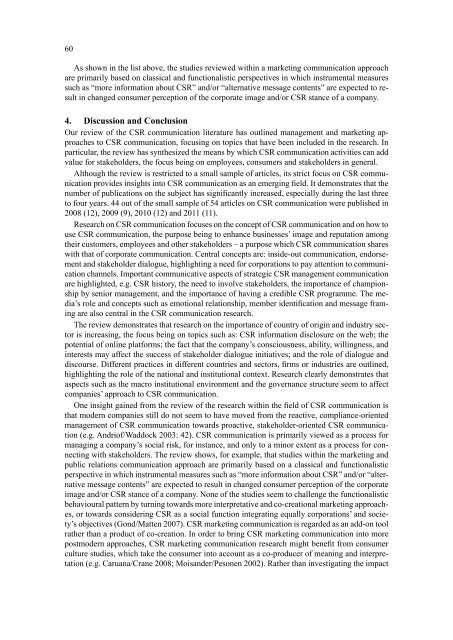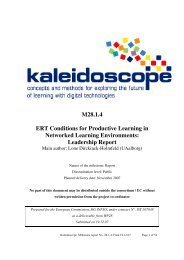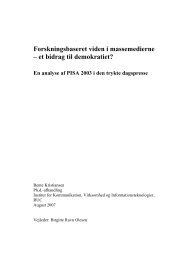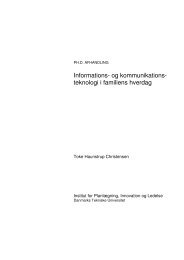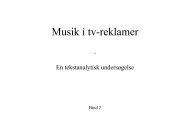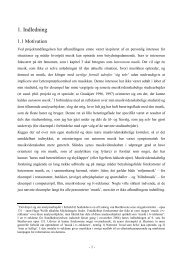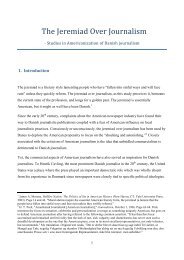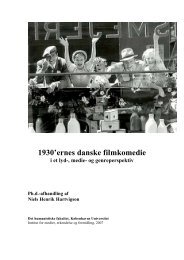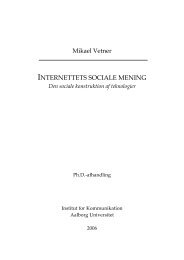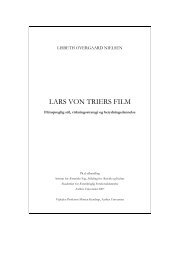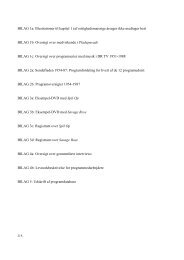Download - Hermes - Journal of Linguistics
Download - Hermes - Journal of Linguistics
Download - Hermes - Journal of Linguistics
You also want an ePaper? Increase the reach of your titles
YUMPU automatically turns print PDFs into web optimized ePapers that Google loves.
60<br />
As shown in the list above, the studies reviewed within a marketing communication approach<br />
are primarily based on classical and functionalistic perspectives in which instrumental measures<br />
such as “more information about CSR” and/or “alternative message contents” are expected to result<br />
in changed consumer perception <strong>of</strong> the corporate image and/or CSR stance <strong>of</strong> a company.<br />
4. Discussion and Conclusion<br />
Our review <strong>of</strong> the CSR communication literature has outlined management and marketing approaches<br />
to CSR communication, focusing on topics that have been included in the research. In<br />
particular, the review has synthesized the means by which CSR communication activities can add<br />
value for stakeholders, the focus being on employees, consumers and stakeholders in general.<br />
Although the review is restricted to a small sample <strong>of</strong> articles, its strict focus on CSR communication<br />
provides insights into CSR communication as an emerging field. It demonstrates that the<br />
number <strong>of</strong> publications on the subject has significantly increased, especially during the last three<br />
to four years. 44 out <strong>of</strong> the small sample <strong>of</strong> 54 articles on CSR communication were published in<br />
2008 (12), 2009 (9), 2010 (12) and 2011 (11).<br />
Research on CSR communication focuses on the concept <strong>of</strong> CSR communication and on how to<br />
use CSR communication, the purpose being to enhance businesses’ image and reputation among<br />
their customers, employees and other stakeholders – a purpose which CSR communication shares<br />
with that <strong>of</strong> corporate communication. Central concepts are: inside-out communication, endorsement<br />
and stakeholder dialogue, highlighting a need for corporations to pay attention to communication<br />
channels. Important communicative aspects <strong>of</strong> strategic CSR management communication<br />
are highlighted, e.g. CSR history, the need to involve stakeholders, the importance <strong>of</strong> championship<br />
by senior management, and the importance <strong>of</strong> having a credible CSR programme. The media’s<br />
role and concepts such as emotional relationship, member identification and message framing<br />
are also central in the CSR communication research.<br />
The review demonstrates that research on the importance <strong>of</strong> country <strong>of</strong> origin and industry sector<br />
is increasing, the focus being on topics such as: CSR information disclosure on the web; the<br />
potential <strong>of</strong> online platforms; the fact that the company’s consciousness, ability, willingness, and<br />
interests may affect the success <strong>of</strong> stakeholder dialogue initiatives; and the role <strong>of</strong> dialogue and<br />
discourse. Different practices in different countries and sectors, firms or industries are outlined,<br />
highlighting the role <strong>of</strong> the national and institutional context. Research clearly demonstrates that<br />
aspects such as the macro institutional environment and the governance structure seem to affect<br />
companies’ approach to CSR communication.<br />
One insight gained from the review <strong>of</strong> the research within the field <strong>of</strong> CSR communication is<br />
that modern companies still do not seem to have moved from the reactive, compliance-oriented<br />
management <strong>of</strong> CSR communication towards proactive, stakeholder-oriented CSR communication<br />
(e.g. Andri<strong>of</strong>/Waddock 2003: 42). CSR communication is primarily viewed as a process for<br />
managing a company’s social risk, for instance, and only to a minor extent as a process for connecting<br />
with stakeholders. The review shows, for example, that studies within the marketing and<br />
public relations communication approach are primarily based on a classical and functionalistic<br />
perspective in which instrumental measures such as “more information about CSR” and/or “alternative<br />
message contents” are expected to result in changed consumer perception <strong>of</strong> the corporate<br />
image and/or CSR stance <strong>of</strong> a company. None <strong>of</strong> the studies seem to challenge the functionalistic<br />
behavioural pattern by turning towards more interpretative and co-creational marketing approaches,<br />
or towards considering CSR as a social function integrating equally corporations’ and society’s<br />
objectives (Gond/Matten 2007). CSR marketing communication is regarded as an add-on tool<br />
rather than a product <strong>of</strong> co-creation. In order to bring CSR marketing communication into more<br />
postmodern approaches, CSR marketing communication research might benefit from consumer<br />
culture studies, which take the consumer into account as a co-producer <strong>of</strong> meaning and interpretation<br />
(e.g. Caruana/Crane 2008; Moisander/Pesonen 2002). Rather than investigating the impact


